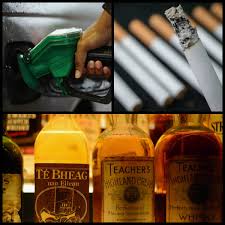MUMBAI: The state government, in a cabinet meeting on Wednesday, decided to impose a ‘drought surcharge’ on a host of items ranging from fuel and liquor to cigarettes and jewellery to raise Rs 1,600 crore for affected farmers. The new taxes will come into effect from Wednesday midnight.
Finance minister Sudhir Mungantiwar said the new tax system will be in place for the next five months till February-end, after which the government will rationalize it.
Political experts dub it a new trend set by the BJP-led state government and fear it may continue in future too.
A surcharge of Rs 2 per litre would be levied on petrol and diesel in Mumbai. Its impact will be lower in rural areas as the local body tax (LBT) was scrapped in the remaining 27 corporations across the state on Wednesday; here, prices will rise by up to 50 paise. Sales tax on liquor, cigarettes and aerated soft drinks will be hiked by 5%, and VAT on gold, diamonds and jewellery by 0.2%.
hike in taxes, Mungantiwar sai the state has increased taxes on items such as liquor, cigarettes and aerated soft drinks that are not essential but considered a luxury.
“In the past six months, the state government has taken a decision for the welfare of the common man, especially distressed farmers. But following the hike in taxes, the government will be able to raise Rs 1,600 crore. People of Maharashtra are sensible enough to bear the hike for the sake of farmers,” said Mungantiwar.
The state had scrapped LBT for traders with less than Rs 50 crore turnover from August 1, 2015. “This had come as a relief as prices of most goods reduced. No LBT was levied on liquor, cigarettes and soft drinks. We have, therefore, decided to increase the sales tax by 5% on these items. After five months, during the budget session, we will rationalize the tax system and come up with a long-term policy on the Goods and Services Tax (GST),” Mungantiwar added.
Asked whether it was the only option left for the government, he said, “In the past six months, people had benefited from withdrawal of value-added tax on petrol as prices fell by Rs 3.41. Petrol prices later dropped further by Rs 2.11 following the international crude crisis. People have gained over Rs 1,000 crore from this reduction. Now, since the state budget is overburdened, we had no other option left but to go for a tax hike.”
The finance minister said the state had to bear a monthly revenue loss of Rs 300 crore per month due to a reduction in fuel prices. “Even after increasing the petrol prices, the rate of tax in Maharashtra—at 27%—is lower than in a few other states such as Andhra Pradesh (39.56%), Madhya Pradesh (32.3%), Rajasthan (32.68%), Punjab (36.38%), Karnataka (32.30%) and Kerala (34.24%). At the same time, LBT on petrol and diesel has been scrapped across the state.”
The state, he said, has to bear a burden of more than Rs 3,330 crore. This includes Rs 1,072 crore for loss of crop, Rs 421 crore compensation to farmers hit by unseasonal rain, Rs 20 crore for repair of their homes, Rs 690 crore for crop insurance, Rs 60 crore for interest waiver on farmers’ loans, Rs 117 crore for restructuring of loans, and Rs 950 crore for distribution of wheat and rice at Rs 2 and Rs 3 in 14 districts of drought-affected areas of Marathawada and Vidarbha under the food security bill scheme.
Meanwhile, more than 40 petrol and diesel dealers and pump owners in Navi Mumbai said they are awaiting further directions from the state government on scrapping of LBT.
“At present, there is some confusion over the fuel rates, as the Rs 2 surcharge was announced today. However, earlier this month, the state government did announce that the LBT charges would go,” said a Vashi-based dealer. B Rasal of an Airoli-based petrol pump said, “If the LBT is removed, then the prices will fall by 3.5%, which is significant. However, we are awaiting written orders.”
Currently, rates of petrol and diesel at Navi Mumbai are Rs 67.61 per litre and Rs 52.58. So, if the LBT factor is removed, the rates will fall to Rs 65.24 per litre and Rs 50.73 per litre, respectively.









1 Comments
Tara Nath Ghimire
Tara Nath Ghimire liked this on Facebook.